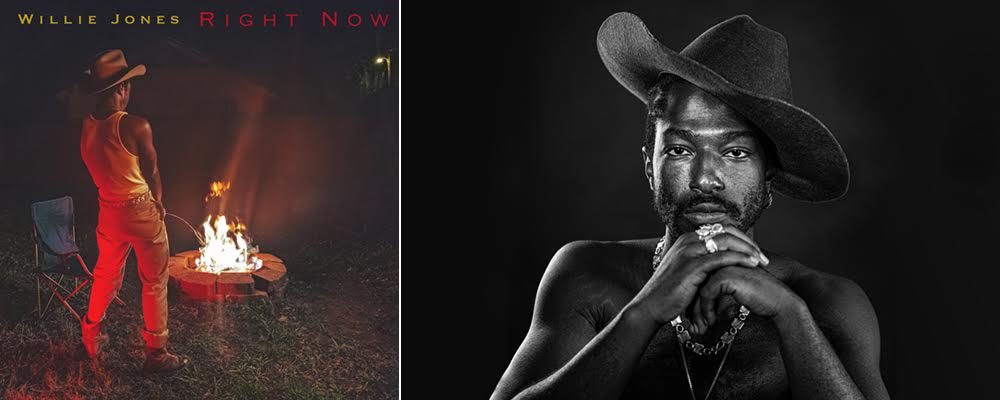With ‘Right Now,’ Willie Jones Searches for His ‘American Dream’
Todd Gilchrist
After decades of white artists building successful careers on the music and iconography of Black innovators, it seems only right that turnabout is fair play. While few and far between, the country genre has seen notable names like Hootie and the Blowfish’s Darius Rucker reinvent his sound as a solo artist and Kane Brown break down the genre’s barriers. Even Lil Nas X’s record-breaking 2018 song “Old Town Road” single-handedly changed the cultural conversation about where diverse Black artists occupy a place, or deserve to, on Billboard’s Hot Country charts, not just reminding country fans that hugely popular Black artists (including Beyoncé for goodness sake) frequently work within the genre, but paving the way for Young Thug and a handful of others to expand its creative boundaries by combining current sounds of hip-hop and soul into a subgenre called “Country trap.” Willie Jones is poised to exploit this momentum further and in a more pointed way with “Right Now,” his first full-length album, which uses country, along with rock, soul and rap influences as pools of reference for a spirited, fun, if slightly calculated musical experience.
“Country Soul,” the opener, sets expectations for potential listeners with a list of musical influences that includes Tim McGraw, Marvin Gaye, Aerosmith and T.I., the latter of whom fittingly guest stars on a remix of “Down For It” after Jones quotes the rapper’s 2008 single “Whatever You Like.” One supposes that after making your debut on “X Factor,” ingratiating gestures like this are to be expected — “I promise, whatever musical genre is your favorite, it’s mine too.” But a single like “American Dream,” released on Martin Luther King Jr. Day, seems to more fully express his perspective than what on other songs eventually become conciliatory references to the language of mostly white country musicians. Singing “We’ve come a long way / Still got a long way to go / When you’re livin’ as a Black man / It’s a different kinda ‘merican dream,” Jones provides a perspective that many listeners have likely never heard in a country song, offering comforting instrumentation and incisive commentary in one four-minute musical slab.
For better or worse, Jones is clearly still developing as a songwriter, so it’s sometimes better to enjoy the twangy ride and not pay attention too closely when he sings country clichés like “And I’m drinkin’ what you’re drinkin’ / If you’re thinkin’ what I’m thinkin’” on “Back Porch.” It doesn’t seem like he’s exactly making fun of Nashville bachelorette parties on “Bachelorettes on Broadway,” but it’s also not clear that he’s celebrating them,especially when a chorus of women chimes in “It’s a celebration, bitches,” either way, this song seems absolutely destined to become an anthem for any future Southern Belle’s pre-wedding blowout. Although “American Dream” casts the album’s longest shadow — or perhaps throws down a gauntlet for the rest of it to pick up — Jones is probably right to build its sound around “Down For It,” where a banjo pairs with trap drums while he effectively, and effortlessly, balances the sensibilities of two genres that until not long ago were dueling rather than dueting. He adds not one but two remixes of it to the end of the album, which are unfortunately not different enough to make a big difference, unless the Billboard Country Chart has started measuring the weight of 808 drums as a criteria for eligibility.
But as Jones continues to use that bass-and-banjo combination on songs like “Trainwreck,” it’s clear that there’s a still-untapped opportunity to merge different sounds and styles, and he has more than enough creativity to do it successfully, whether or not he has the conviction. Certainly it isn’t that he doesn’t sound like “true country” — you can put this on a playlist with Morgan Wallen right now and it would fit perfectly — but it will be interesting to watch how successful he becomes (or must) before he really cuts loose and creates music that doesn’t just sound like it’s capitulating to trends. It’s also important to note just how much overlap there already is between the genres he’s straddling; the subject matter of “Drank Too Much,” for example, could be easily refigured as a song by Future or Big Sean and the only thing that would change is the level of vulnerability in the lyrics. Because what he’s exposing is that in music just like in so many other areas of public contentiousness, there are more similarities bringing people together than differences keeping them apart.
Consequently, it’s undeniable that he has talent, but right now Willie Jones is an outlier trying to prove that he is part of the conversation, a route that will and should bring him success even if it isn’t all that interesting. In which case, “Right Now” is a good name for the record, because that’s what it feels like it was made for; mainstream country music is in greater need than an other genre for a racial reckoning, and this record sets the stage for Jones not only to capitalize on what has become a great commercial opportunity, but move forward and create a meaningful and necessary cultural shift.
“Right Now” releases Jan. 22 on Apple Music.

